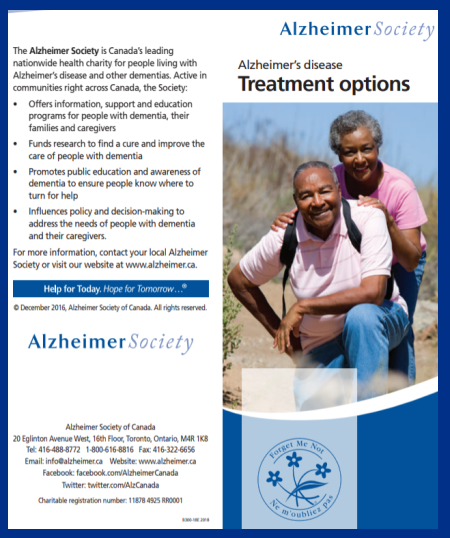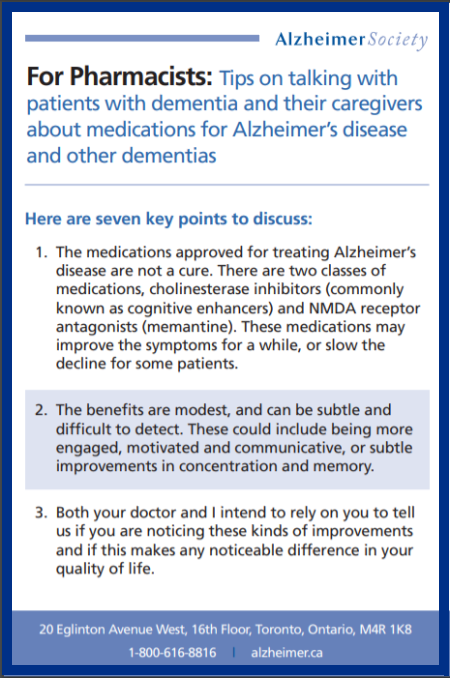Other resources and tools for health-care providers
Get resources on driving, pain, dementia research, self-management, long-term care and more.

Feedback:
Please feel free to email us at [email protected] to submit your feedback and suggest useful information and resources for your peers.
Disclosing and communicating a diagnosis
Once a diagnosis has been determined, it’s important to communicate the diagnosis clearly. We have a new, user-tested set of guidelines to do just that, along with a brief toolkit and infographic. You can find this at guidelines.alzheimer.ca
Assessing and managing pain
People with dementia feel pain, just like everyone else. As the dementia progresses, the person’s language skills may change, making it very difficult for them to communicate to others when they are in pain.
This can cause their pain to go undetected and untreated. If pain goes unnoticed, the person with dementia may feel significant distress for a prolonged period of time. If the person with dementia is not able to use words to communicate their pain, they may start using behaviours as a way of communication. Some of the behaviours may include becoming agitated or withdrawing from others.
Others may find these behaviours disruptive, resulting in inappropriate use of treatments such as antipsychotic medication. Pain should be assessed routinely, and should be considered as a possible cause of any change in the person’s behaviour. Often times, treating the underlying pain lowers or diminishes behaviours.
People living with dementia are at a higher risk of falling or injuring themselves, both of which can be painful. If the person sits or lies in the same spot for long hours without moving, the risk for constipation, joint stiffness, pressures sores and muscle contraction increases – all of which can cause severe pain and discomfort. In addition, a person with dementia may not remember how they hurt themselves or why they are in pain, adding to the difficulty of trying to communicate their pain to others.
Download How does pain affect people with dementia? (PDF)
Conversations about driving
Doctors and clinicians are often approached to assist people with Alzheimer’s disease and their families in determining when a person can no longer continue to drive.
Doctors are bound by law, in some provinces, and by professional ethics, to report medical conditions that could impair a person’s ability to drive. They also may be held liable if a person in their care who has Alzheimer’s disease is involved in an auto accident and they have not reported the person’s driving problems to provincial licensing authorities.
Resources and useful strategies related to driving and dementia
- Conversations About Dementia and Driving. The Alzheimer Society of Canada’s “Conversations” series was created to help people with dementia, caregivers, and healthcare providers have conversations about complex and sensitive topics related to living with dementia. This sheet provides information on things to consider when having conversations about driving cessation.
- Driving and Dementia Roadmap. Canadian Consortium on Neurodegeneration in Aging Team 16. Created for people living with dementia, caregivers and healthcare providers, this resource helps users understand how dementia can impact driving; identify when it becomes unsafe for people living with dementia to drive; and adjusting to life without driving.
- Driving and Dementia e-Learning Module. This free e-learning module addresses the needs of physicians for resources related to driving and dementia, and to help navigate the process of assessing fitness-to-drive, disclosure, reporting and more.
- Driving and Dementia, an online video with strategies for caregivers from the Alzheimer Society of B.C.
- Driving and Dementia, a presentation hosted by brainXchange, focuses how Alzheimer’s disease or dementia effects the ability to drive and on the evaluation process to assess fitness-to-drive.
- Dementia and Driving Resource Center from the Alzheimer Association of the US. Realistic video scenarios to help families start the conversation about driving.
- DriveABLE. An innovative technology can help health-care professionals quickly and accurately determine the driving competence of medically at-risk drivers.
- CMA Driver's Guide. Determining medical fitness to operate motor vehicles.
- Older Drivers in Canada and their Families. A website providing useful tips on safe driving and risk-reducing strategies. Developed by the Canadian Association of Occupational Therapists in association with the Public Health Agency of Canada.
- Driving assessment for people with dementia. Canadian Family Physician, October 2018. This article asks and answers the question: How should driving safety be assessed in dementia? Authored by Christopher C. Frank, Linda Lee and Frank Molnar.
Conversations about medications
Several medications are available that can help with some of the symptoms of Alzheimer’s disease and other dementias, symptoms such as changes in memory, language, thinking abilities and motor skills. It is important to have conversations with the person living with dementia and their caregivers about their medication options.
Resources and useful strategies related to conversations about medications:
This print-friendly, downloadable brochure provides a brief overview of the medications that are currently available for people living with Alzheimer's disease. Also available to download in a version suited for mobile devices (PDF).

This downloadable, one-page infosheet was created to help doctors have conversations with people living with dementia and caregivers regarding treating Alzheimer’s disease and other dementias with medications. This sheet provides key points to discuss when having conversations about medications.

This downloadable, one-page infosheet was created to help pharmacists have conversations with people living with dementia and caregivers regarding treating Alzheimer’s disease and other dementias with medications. This sheet provides key points to discuss when having conversations about medications.

Dementia research
In this section, you will find a sample of the latest research on Alzheimer's disease and other dementia.
Alzheimer Society Research Program
The Alzheimer Society Research Program (ASRP) is a collaborative initiative of our Alzheimer Society Federation, in which all the provincial Alzheimer Societies, the Alzheimer Society of Canada (ASC), partners and donors pull together to support research directed at both eradicating dementia and improving the lives of those affected by it.
The Alzheimer Society Research Portal connects researchers with Canadians looking to participate in research studies.
Learn about research projects funded by our Alzheimer Society Research Program by searching our online database.
External resources on both national and international research on dementia
Alzheimer Research Forum: promotes scientific communication and creative thinking in the search for the causes and treatments for Alzheimer's disease.
Murray Alzheimer Research and Education Program: Using a collaborative approach, MAREP integrates research and education in an effort to improve dementia care practices. They operate out of the Schlegel-UW Research Institute for Aging (RIA).
Research Canada: an Alliance for Health Discovery is a not-for-profit, voluntary organization that is a strong national voice for health research advocacy in Canada.
Nutrition and dementia: a review of available research (PDF) published by Alzheimer’s Disease International (ADI), London, February 2014. Review of a number of areas in existing research regarding the relevance of nutritional factors to primary and secondary prevention of dementia, undernutrition in dementia and interventions to improve the nutrition of people living with dementia.
Resources for long-term care
Moving to long-term care can be a significant and challenging transition for the person with dementia and their family. This list will provide an overview of Alzheimer Society resources that can support staff, people with dementia and families before, during and after the transition to long-term care. These resources are available on our website or from your local Alzheimer Society.
Download Resources for long-term care (PDF)
Self-management
Chronic diseases are thought to be one of the most significant health challenges in the 21st century (Dorland & McColl, 2006). Self-management of chronic disease is becoming more common as an approach to chronic disease prevention and management. However, self-management has typically been focused on chronic diseases such as cancer, arthritis, and diabetes.
While dementia typically has not been labelled a chronic disease, it has all the characteristics of a chronic disease in that it is progressive and there currently is no cure or treatment, only alleviation of symptoms.
One of the most pressing issues is the need for self-management approaches to dementia (Mountain, 2006).
“The commonly held view that people with dementia cannot learn new skills and therefore any intervention will at best fail and at worst have an adverse effect upon the person and their carer, is now being challenged” (Mountain, 2006, p. 434).
Self-management is a beneficial strategy in responding to the increasing incidence and prevalence of dementia, and also in helping people with dementia and their family in retaining control over their lives.
Resources on self-management
- Self-management support for Canadians with chronic health conditions: A focus for primary health care
- brainXchange has a section dedicated to self-management and dementia including research projects updates and tracking forms.
Resources for diverse cultures and communities
The Dementia in the Black Community video series is a resource for health-care providers, care partners, people living with dementia, and anyone interested in understanding the unique experiences of the Black community with dementia.
The Dementia in the Chinese Community video series is a resource for health-care providers, care partners, people living with dementia, and anyone interested in understanding the unique experiences of the Chinese community with dementia.
Dementia information for Indigenous Peoples
A space for sharing information about dementia care in different Indigenous communities across the country, including articles, care tools, support and resources.
Dementia resources in other languages.
Facts about dementia in multiple languages.
LivingMyCulture.ca.
People from various cultures share their stories and wisdom about living with serious illness, end of life and grief to support others.
Understanding how dementia is affecting culturally diverse communities across Canada. Work is underway at the Alzheimer Society of Canada to ensure that dementia knowledge and care are readily accessible for people living with dementia and their care partners in culturally diverse communities.
Resource list for family physicians
This document outlines a list of resources that can provide education and support to family physicians and people living with dementia. The resources in this list address six distinct topic areas: diagnosis, driving, communication, changes in behaviour and treatment and care.
Download the Resource list for family physicians (PDF)
